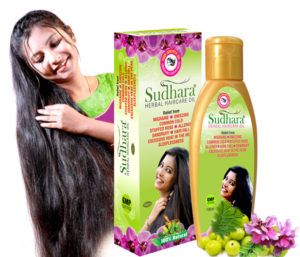
The Ultimate Ayurvedic Haircare Solution for Beautiful and Luxurious Hair
Is your unhealthy hair a reflection of your bad diet and lifestyle? Yes! Traditional Ayurvedic science underlines the interdependence of hair health with what you eat and how you live.
“Besides topical treatments with medicinal herbs, Ayurveda involves the concept of healthy Ahara-Vihara (diet and lifestyle), which benefits the wholesome well-being of your body and mind along with your hair health,’’ says Dr. Zeel Gandhi, Chief Ayurvedic Doctor at Vedix.
Holistic approach of Ayurveda calls for a consistent haircare routine for healthy hair. This is exactly what have prompted us to develop Sudhara Health Care Oil, a 100% pure Ayurvedic Solution for a Healthy, Beautiful & Luxurious Hair.
Haircare Routine
What exactly is Hair Care routine according to Ayurvedic Science? The three vital steps for this are explained below:
1). KNOW YOUR HAIR TYPE
According to Ayurveda, the three vital energies Vata, Pitta and Kapha regulate our bodily activities. Each individual is a combination of these tridoshas, with one or two doshas in dominance. This determines your hair type and hair health.
A. Vata Hair
You will have a Vata hair type if you have Vata-dominant Prakriti. Proper nutrition to your hair follicles keeps Vata dosha in balance. A normal Vata hair type tends to be thin, straight hair with higher porosity.
When Vata dosha aggravates in your body, it causes dryness of your scalp and hair with very low sebum production. This eventually results in dry and frizzy hair, split ends and hair loss.
B. Pitta Hair
You will have a Pitta hair type if you have Pitta dominant Prakriti. Pitta is responsible for metabolic activity in hair, regulates the production of pigments and hair proteins.
A healthy Pitta hair tends to be wavy with a medium thickness. Premature graying, clogged follicles with bacteria build-up, scalp inflammation, redness, hair loss, etc. are caused when Pitta is imbalanced.
C. Kapha Hair
You will have a Kapha hair type if you have Kapha dominant Prakriti. Kapha energy is responsible for your hair structure and its lubrication. A healthy Kapha hair is thick, lustrous, and curly.
Any imbalance in Kapha results in overproduction of sebum on your scalp, which eventually leads to oily dandruff with a greasy scalp, itching, hair fall, etc.
2). CHOOSE THE RIGHT HAIR OIL AND SHAMPOO BASED ON YOUR HAIR TYPE
Make sure your basic hair products like your hair oil and shampoo contain Ayurvedic herbs that work on your aggravated Dosha levels. Choosing wrong hair products may worsen your hair condition and cause an imbalance in your Doshas.
Here is the list of few Dosha-specific herbs that you can seek in your hair care products:
A. Vata-Pacifying Herbs
Palandu (onion), Gunja (Rosepea), Yashtimadhu (Licorice), Devdar (Cedar), Krishna Tila (black sesame), Saireyaka (Barleria Prionitis), Ashwagandha (Withania Somnifera) , Shatavari (Asparagus Racemosus), etc.
B. Pitta-Pacifying Herbs
Yashtimadhu (Licorice), Japa (Hibiscus) [3], Kamala (Nelumbo Nucifera), Nimba (Neem), Lodhra (Symplocos Racemosa), Karanja (Pongamia Pinnata), etc.
C. Kapha Pacifying Herbs
Gunja (Rosepea), Grapeseed, Kushta (Saussurea Costus), Methika (Fenugreek), Karpoora (Camphor), Jyotishmathi (Celastrus Paniculatus), Daruharidra (Berberis Aristata), etc.
D. Tridosha Haras (Herbs to pacify all three Doshas)
Kumari (Aloe Vera), Brahmi (Bacopa Monnieri), Bhringraj (Eclipta Alba), Amalaki (Indian Gooseberry), Tagara (Valerian root), etc.
3). OIL YOUR HAIR REGULARLY
“According to Ayurveda, your scalp is the composition of various energy-relieving points called ‘Marmas’. Oiling your scalp and hair is the rejuvenation tool to extricate any excess or aggravated Doshas accumulated in your head through Marmas,’’ says Dr. Zeel.
Ayurveda recommends oiling your hair 2-3 times a week. You can also fix your frequency of oiling based on your hair type. Kapha hair type can be oiled with less frequency whereas the Vata hair type needs more oiling than Pitta and Kapha types.
Traditional Ayurvedic practices involve oiling your hair at least 20 minutes before your hair wash. For better results, massage your scalp and hair with warm oil at night and wash your hair the following day. This works as an exceptional natural conditioning treatment for your scalp and hair.
Sudhara Herbal Procedure
1. Apply warm Sudhara Herbal Haircare Oil across your scalp.
2. Massage your entire scalp in a circular motion using your finger pads for about 15 minutes.
3. Now, work some oil from your hair roots to tips by giving a gentle massage.
Circular scalp massage stimulates the blood circulation and enhances the oil absorption into deep layers of your scalp. You can also use coconut oil, sesame oil, almond oil, olive oil, etc. to massage your scalp and hair regularly.
4. Wash Your Hair Regularly.Your scalp follicles get clogged with the unwanted build-up of excess oils, dirt and grime, which you need to cleanse out through regular hair wash with Ayurvedic shampoos.
5. Condition Your Hair Regularly With Hair Masks.Hair masks or ‘Shiro lepa’ in Ayurvedic terms is one of the extremely beneficial therapies to nourish and deeply condition your scalp and hair. Ayurveda suggests applying hair masks once in a week or fortnight to keep your scalp and hair in good health while it also helps you combat internal hair loss factors like stress and anxiety.
6. Learn How to Comb
Combing is one of the effective ways to enhance blood circulation on your scalp. It helps in detangling your hair and spreading your scalp’s natural oils evenly over your hair strands. But, vigorous combing can damage your hair by stretching it and this may lead to hair breakage and split ends.
7. Avoid Heat Styling
Overuse of heat styling tools like blow-dryers [6], straightening or curling irons, etc. leave your hair moisture-less over time, which may lead to serious damage to your hair. It spikes up Vata dosha causing dryness, breakage, split ends and hair fall. It is better to leave your hair for air drying after your hair wash.
A Few important Haircare Tips
Besides temporary physical adhesion, air pollutants that are absorbed into hair can cause irreversible chemical damage. And, cigarette smoke contains all the main class pollutants which are 150 times higher than air pollution.
A balanced nutritional diet is one of the predominant factors which keep your Doshas in balance, and thus, your hair in good health. Besides choosing your foods based on your Prakriti, make sure your foods include essential nutrients for hair growth like Vitamins A, B, C, D, E and K, and minerals such as iron, zinc, etc. along with protein.
Also, Ayurveda suggests to include Pitta (digestive fire)-improving herbs like methi (fenugreek), jeera (cumin), Haridra (turmeric), dhania (coriander) and maricha (black pepper) in your regular diet. Consuming Triphala Churna, hingu (asafoetida) and seasonal fruits (especially citrus) can enhance your digestion capacity and immunity, irrespective of age group and dosha type.
The Last but not the Least!
Ayurveda is the way of life to remain balanced and spirited by aligning our bodily rhythms with the rhythms of nature. This is achieved through the routine which suits your unique Prakriti and corresponding hair type while you can attain exceptional hair health by keeping your doshas in balance. Sudhara Herbal Haircared Oil has been developed on the basis of these traditional Ayurvedic Principles and that’s how it has already become a preferred choice of haircare conscious millions
